Project Overview
Project Overview
Our project is focused on the following-big picture research questions:
- To what degree is Sri Lanka experiencing water stress, and how might SL experience water stress under future climate change scenarios?
- How are farmers responding to water stress?
- When & why do farmers adopt water-efficient cultivation?
- What variations exist across social, institutional, and hydrological settings?
- What leverage points exist for enhancing resilience and improving livelihoods in the face of climate change?
Research Plan
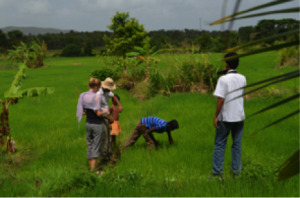
We are gathering data from multiple sources and collecting new data to provide an overall picture of the factors that affect farming practices in the face of climate change. This plan includes:
- conducting interviews with farmers to learn about their farming decisions,
- gathering existing data on climate conditions, including temperature and rainfall,
- developing a rich contextual understanding of the institutional processes that influence farming
- developing a model that links all this data together
A number of sub-projects to collect and analyze data are already underway. Our research program is continuously evolving as our researchers integrate their diverse methods and knowledge.
View images from our field work here.
Organizational Structure
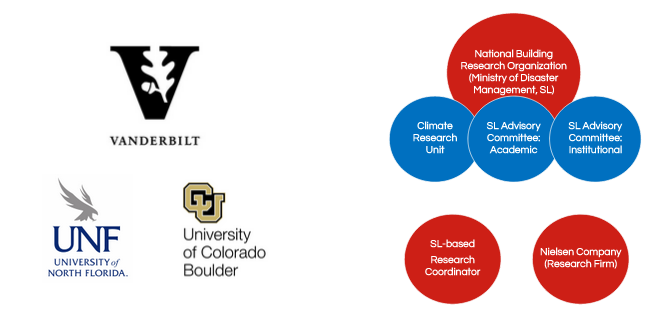 This project is spearheaded by investigators from Vanderbilt University, University of North Florida, and University of Colorado-Boulder. Research guidance is obtained from both a U.S.-based Research Advisory Committee. A Sri Lanka-based Stakeholder Advisory Committee (SAC) also advises our team so that the results generated lead to implementable changes that support farmers. The SAC is coordinated by NBRO’s recently established Climate Research Unit (CRU). The CRU conducts policy-relevant research into climate change impacts and adaptation in Sri Lanka. Our research efforts can be categorized into three disciplinary-focus teams and one integrative team:
This project is spearheaded by investigators from Vanderbilt University, University of North Florida, and University of Colorado-Boulder. Research guidance is obtained from both a U.S.-based Research Advisory Committee. A Sri Lanka-based Stakeholder Advisory Committee (SAC) also advises our team so that the results generated lead to implementable changes that support farmers. The SAC is coordinated by NBRO’s recently established Climate Research Unit (CRU). The CRU conducts policy-relevant research into climate change impacts and adaptation in Sri Lanka. Our research efforts can be categorized into three disciplinary-focus teams and one integrative team:
Hydro Team
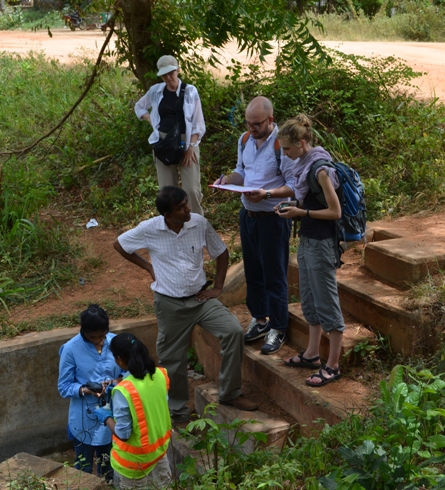 The hydro team aims to examine historic temperature and rainfall data in Sri Lanka to understand past climate patterns and how water availability for both rain fed minor tanks and for major works in the Mahaweli irrigation system might change given future climate projections. The team is also interested in looking into related questions around soil and irrigation water quality. This team is working with NBRO’s CRU researchers to develop a drought risk identification tool to inform local level decision makers. Specific projects currently underway include:
The hydro team aims to examine historic temperature and rainfall data in Sri Lanka to understand past climate patterns and how water availability for both rain fed minor tanks and for major works in the Mahaweli irrigation system might change given future climate projections. The team is also interested in looking into related questions around soil and irrigation water quality. This team is working with NBRO’s CRU researchers to develop a drought risk identification tool to inform local level decision makers. Specific projects currently underway include:
- An analysis of temporal and spatial trends in the Palmer Drought Severity Index (PDSI) and the development of a local decision support tool informed by these analyses.
- The use of principal components analysis to examine shifts in rainfall patterns in Sri Lanka from 1881 -2011.
- The application of the DeNitrification-DeComposition (DNDC) Model to understand how alternative farming methods, climate, and soil properties might affect rice yields, nitrate leaching, and greenhouse gas emission.
Pyschosocial Team
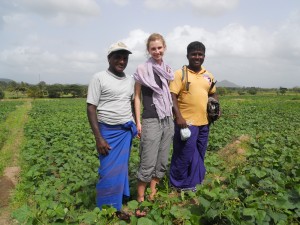 The psychosocial team is in charge of the Sri Lankan Environmental and Agricultural Decision-making Survey (SEADS), a longitudinal survey that will be administered in 30
GNs throughout the study area between 2013 and 2017.
This effort will include a household survey administered
to paddy farmers and collects information about
household demographics, farm inputs and outputs, water vulnerability, and adaptive responses. A
community profile will also be conducted in which key leaders within the community are interviewed to understand the availability of resources and services. We plan to complete annual or semi-annual follow-up surveys throughout the project period. With these data we plan to carry out the following analyses:
The psychosocial team is in charge of the Sri Lankan Environmental and Agricultural Decision-making Survey (SEADS), a longitudinal survey that will be administered in 30
GNs throughout the study area between 2013 and 2017.
This effort will include a household survey administered
to paddy farmers and collects information about
household demographics, farm inputs and outputs, water vulnerability, and adaptive responses. A
community profile will also be conducted in which key leaders within the community are interviewed to understand the availability of resources and services. We plan to complete annual or semi-annual follow-up surveys throughout the project period. With these data we plan to carry out the following analyses:
- Document adaptive responses adopted by farmers to cope with water scarcity and examine their potential for more widespread diffusion;
- Examine individual, household, and community level factors that contribute to vulnerability or resilience in the face of water stress;
- Identify opportunities for developing or improving services that can assist farmers to cope with water stress;
- Assess the impacts of new irrigation infrastructure, policies, interventions, land use changes, and climate change on household and community agricultural productivity and socioeconomic outcomes over time The primary analytical tools will include multi-level modeling, structural equation modeling, and agent based modeling.
Completed Activities:
- 278 Initial and 6 month follow up Farmer Surveys
- 6 community surveys, interviewing a total of more than 30 community officials
Policy Team
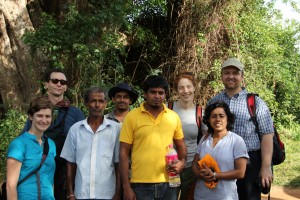 The policy team is seeking to understand the social, cultural, political, and economic contexts which affect agriculture and agricultural decision making in Sri Lanka. The team has interviewed officials from governmental agencies and non-governmental organizations and conducting archival and policy analysis work. In addition, the team plans to conduct oral histories and gather in-depth social and cultural information in four villages in Sri Lanka.
The policy team is seeking to understand the social, cultural, political, and economic contexts which affect agriculture and agricultural decision making in Sri Lanka. The team has interviewed officials from governmental agencies and non-governmental organizations and conducting archival and policy analysis work. In addition, the team plans to conduct oral histories and gather in-depth social and cultural information in four villages in Sri Lanka.
Completed Interviews:
- 5 Farmer Focus Groups
- 60 Farmer Interviews
- 70 Key informant interviews
Integrative Team
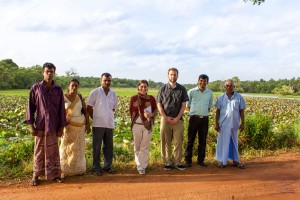 The integrative team uses computer simulation to understand how the decisions taken by individuals and communities interact to affect the success of different strategies for managing water scarcity in a complex coupled human-natural system. A simple model of a rice cultivating village is currently being developed; as the other teams’ research produces more detailed descriptions of agricultural decision making in Sri Lanka, results will be incorporated into this model. As the model increases in scope, it will be used to analyze multiple scenarios to identify adaptations and policies that can lead to optimal livelihood outcomes for farmers. The modeling team will play a major role in integrating data across the climate and hydrological, survey, and context analysis teams throughout this project. The primary methods for integration being explored by the team are agent-based modeling and systems modeling.
The integrative team uses computer simulation to understand how the decisions taken by individuals and communities interact to affect the success of different strategies for managing water scarcity in a complex coupled human-natural system. A simple model of a rice cultivating village is currently being developed; as the other teams’ research produces more detailed descriptions of agricultural decision making in Sri Lanka, results will be incorporated into this model. As the model increases in scope, it will be used to analyze multiple scenarios to identify adaptations and policies that can lead to optimal livelihood outcomes for farmers. The modeling team will play a major role in integrating data across the climate and hydrological, survey, and context analysis teams throughout this project. The primary methods for integration being explored by the team are agent-based modeling and systems modeling.
©2024 Vanderbilt University ·
Site Development: University Web Communications